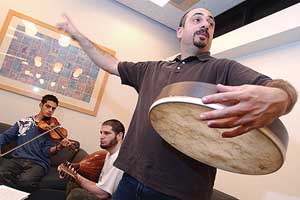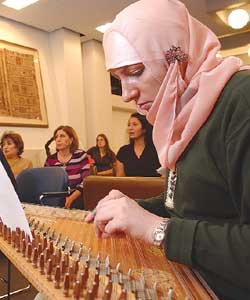Middle East Music Ensemble: Group takes anthropological approach to music-making
By Jennifer CarnigNews Office
 Issa Boulos, Director of the Middle East Music Ensemble and Lecturer in Music, directs the group during a rehearsal. The group will perform Saturday, Nov. 13, in Breasted Hall in the Oriental Institute.  The group, which draws an audience of listeners to its rehearsals, practices in Albert Pick Hall.  Serpil Borazan plays the qanun at the recent rehearsal. | |
As they pick up their instruments at an after-hours rehearsal, a diverse collection of about 50 faculty and student musicians make the room go electric. When the rest of the University is shutting down for the night, it feels like a party is starting in Albert Pick Hall as members of the Middle East Music Ensemble tune their instruments.
The first show of the season is still a few weeks off, but it does not keep the fans away. Before practice even starts, five admirers sit on the steps, waiting and watching, their ears ready for the international treat they are about to be served.
“These are phenomenal musicians,” says Alex Wing, a June graduate from the College who decided to continue living in Chicago after school ended so he could keep playing with the ensemble. “There’s an ebb and flow that occurs when we play that makes these pieces live and breathe.”
The room certainly comes alive when they play. The crowd on the stairs starts bobbing their heads to the beat and rocking back and forth in a little dance during the first number. As the rehearsal goes on, their movements grow bolder, and soon their arms are waving, too.
Arab music is infectious music, it seems, and it is next to impossible to stay still when hearing it.
Wing credits the group’s success to its director, Issa Boulos, a Lecturer in Music, who began working with the ensemble in 1998. A composer of Arab classical and contemporary music, Boulos was born in Jerusalem in 1968, and grew up in the West Bank city of Ramallah, where he studied music at the Institute of Fine Arts.
He moved to Chicago in the early 1990s to pursue degrees in music composition at Columbia College and Roosevelt University.
Boulos’ musical training is undoubtedly a key to the ensemble’s success. Middle Eastern music comes from an oral tradition, the conductor explains, so for his group to perform a song, Boulos must first listen to the composition and then transcribe the tune into sheet music. It is an endeavor he estimates takes up about 60 percent of his time. But it is a labor of love.
“Working with the ensemble allows me to become more acquainted with my own ethnic tradition,” the artist says. “And more importantly, I’m helping preserve the music that I love, which might otherwise get lost. It’s not like you can walk into Tower Records and buy a CD of this.”
In addition to writing the music, Boulos also has taught many of the musicians how to play their instruments. Wing, for example, came to the ensemble as a classically trained jazz guitarist. But there are no guitars in Middle Eastern music. So Boulos taught him to play the oud, a pear-shaped Middle Eastern lute.
This authenticity is the ensemble’s biggest accomplishment, Boulos says. Singers perform only in their native tongue, and the only instruments played are those that would have performed the piece originally. Boulos and Wing are two of about half a dozen oud players, who are joined by musicians playing baglamas (long, thin stringed instruments), nays (tube flutes), qanuns (a type of zither) and darbukkahs (single-headed hand drums).
The only instruments with a Western origin that are allowed are those that have authentically found their way into Middle Eastern music, such as the clarinet, the cello, the accordion and the double bass.
“The University is a research institution and highly academic, so I wanted to present interpretations that reflect the nature of our institution and present a truly cultural experience,” Boulos says. “We accomplish that by taking the anthropological approach to music-making.”
November is Arab Heritage Month, and the ensemble will mark the occasion with a performance at 8 p.m. Saturday, Nov. 13, in Breasted Hall at the Oriental Institute, 1155 E. 58th St., and 8 p.m. Tuesday, Nov. 23, in Fulton Recital Hall in Goodspeed Hall, 1010 E. 59th St. Both shows are free and open to the public. For more information, visit http://music.uchicago.edu, or call (773) 702-8069.
![[Chronicle]](/images/sidebar_header_oct06.gif)